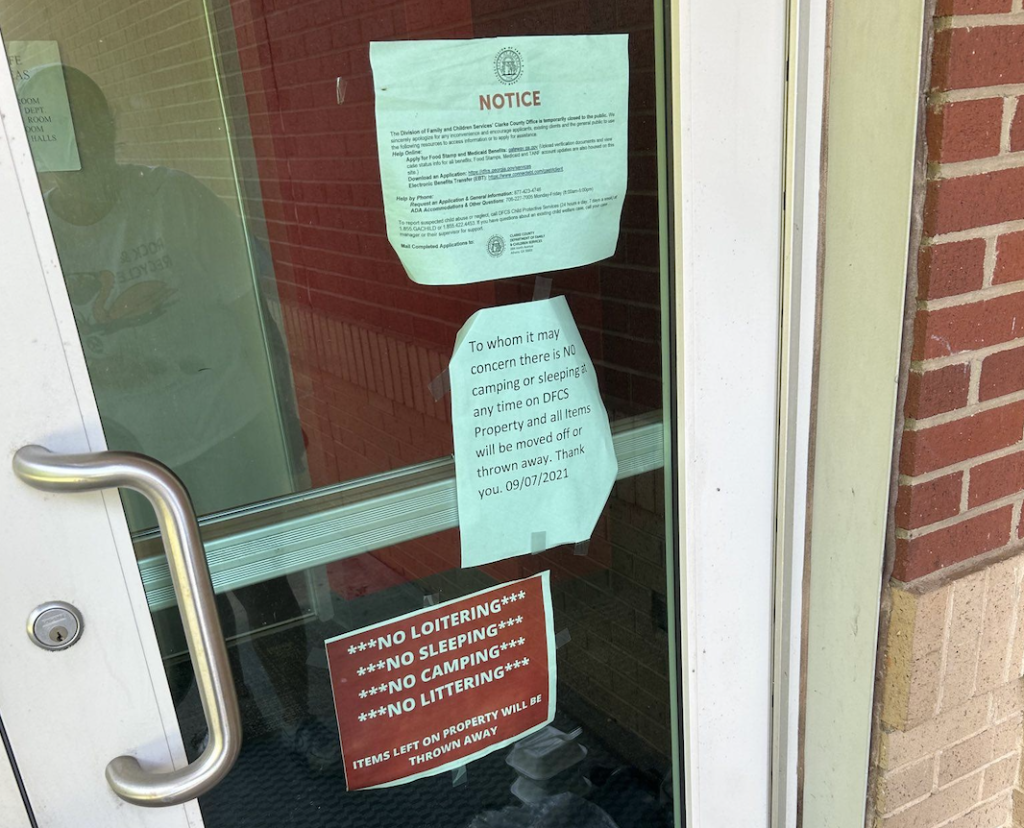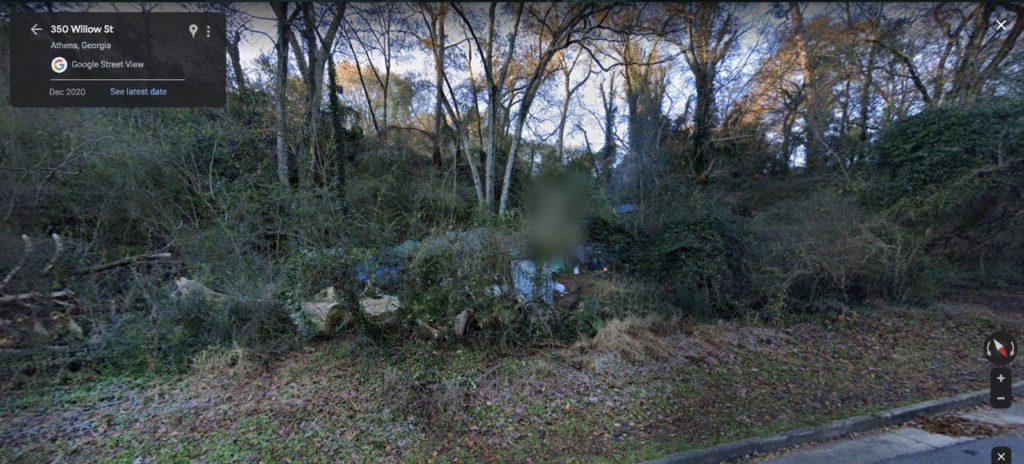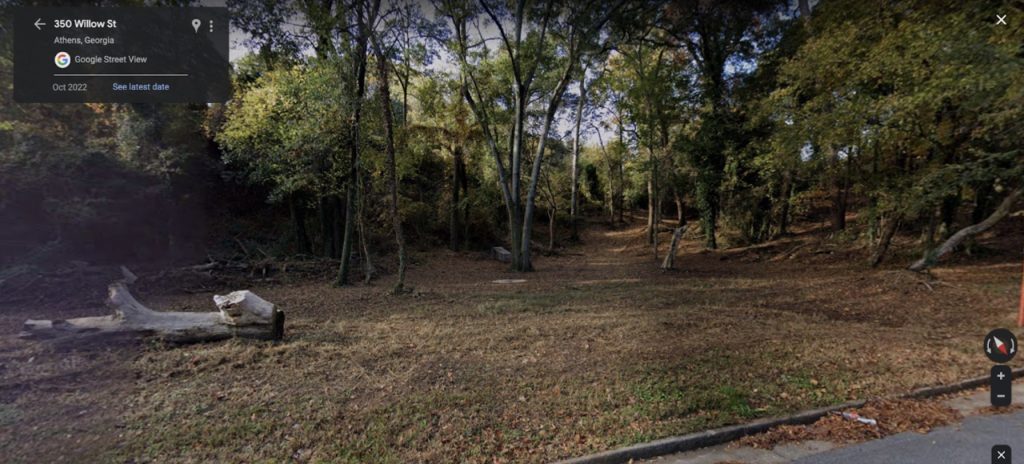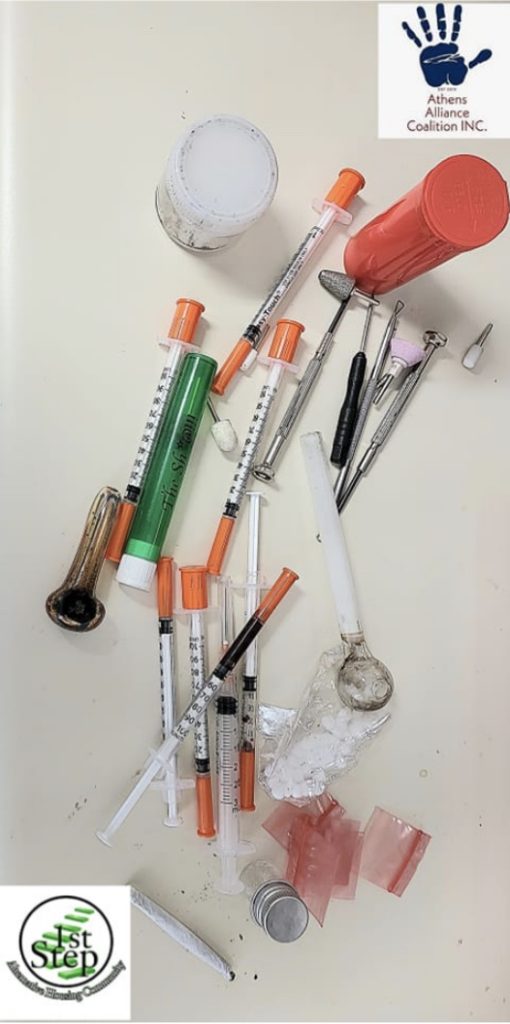Transcarceration and Houselessness in Athens
by Casey Serrano

In 2022 the Athens-Clarke County Commission authorized a consulting firm to conduct a $133000 study on houselessness in Athens and provide recommendations. This study will join with annual Point-In-Time Counts, ACC surveys, data from non-profits and social services, and general commentary from the community on Athens’ large, visible unhoused population. What these conversations often lack is a real engagement with the perspectives of unhoused people and a rigorous sociological understanding of the underlying logics and impacts of current policies. First Step is a sanctioned houseless encampment that was opened in 2021 under the supervision of local nonprofit Athens Alliance Coalition with money from the Commission. This encampment may appear progressive. However, an examination of sociological theory in conjunction with the words and experiences of unhoused communities reveals that it functions under a transcarceral framework to remove unhoused communities from sight while bringing them closer to the carceral and legal system. These frameworks begin with labeling unhoused communities as criminal and “other” which justifies the removal of unhoused people from view through banishment policing. Encampments like First Step can function as convenient release valves for this removal, and do not address the roots of chronic houselessness. When solutions to houselessness start with labeling and policing behaviors and people rather than understanding and solving underlying conditions, they are ultimately ineffective and often harmful.
transcarceration, houselessness, housing, encampments, shelters
Introduction
COVID-19, like all disasters, has exacerbated pre-existing crises on an individual and a societal level, and chronic houselessness is no exception. In Athens, the 2019 Point-in-Time count for unhoused individuals totaled 237 people, and in 2022 the count was up almost 20% to 283 people. This is still considered “a significant underrepresentation of unsheltered homelessness” due to methodological limitations (Housing Inventory Count & Point-in-Time Count Report, 2022). There are a few particularities about houselesness in Athens that differentiate it from other towns with comparable populations and budgets. First and foremost, Athens must cater towards students and their parents in order to continue to attract money to the town, as opposed to non-college towns whose economies do not rely on an influx of students. At the beginning of the 2022 Fall semester several UGA parents, who do not live in Athens, came to an Athens Clarke County Commission meeting and were quoted as saying unhoused people in Athens are “just incredibly scary. We would appreciate if you could do something” (Dowd, 2022). Additionally, when UGA has large events like football games, thousands of people come to town, and they bring similar attitudes with them. Over years of working closely with unhoused communities, I have witnessed Athens struggle to understand and plan for its unhoused community while responding to fears from the UGA community, as unhoused people continue to face police violence, evictions, and a huge resource shortage. In 2021, the City of Athens opened First Step, a sanctioned encampment, to try to close this gap. Unfortunately, the resources available to unhoused people in Athens, including First Step, are products of transcarceral ideologies and mainly work to remove unhoused people from view and bring them into contact with the carceral system.
Criminological Perspectives of Houselessness
Labeling Theory
When considering how houselessness is treated, it is first important to understand how it is conceived socially. Sociologist Randall Amster writes that “For at least six centuries, homelessness has been associated with “disorder” and criminality” (Amster, 2003, p. 200). Labeling theory is a sociological theory that provides a framework for understanding how this label both reflects and causes societal attitudes about houseless populations. According to labeling theory “any construction of ‘otherness’ as lawlessness necessarily becomes a self-fulfilling prophecy” (p. 200). Societal perceptions of unhoused people as disordered criminals labels them as a particularly dangerous other. This is not to say that houseless people fulfill their label by behaving criminally, but that constructions of criminality are changed to encompass behaviors associated with unhoused people such as sleeping in public (p. 200).
In Athens, we can see people experiencing houselessness being labeled as dangerous others when UGA parents go out of their way to explicitly link “homelessness, trash, and crime” (Dowd, 2022). Once people have been labeled as “others,” the legal system’s perception of them changes. In Athens, I have witnessed the police remove unhoused people from their homes after people report them as a “public nuisance” or “disorderly.” Societal labeling of unhoused people as criminals clearly increases their interactions with police and the legal system.
Broken Windows Theory
Once it is understood how unhoused people are perceived, it is possible to look at more explicitly criminological perspectives on houselessness. Broken Windows Theory states that signs of disorder, for example a broken window, create a disordered environment where crime can flourish; interestingly, the original article laying out Broken Windows wrote that “The unchecked panhandler is, in effect, the first broken window” (Amster, 2003, p. 207). Analyzing this statement through a labeling theory lens, it is clear how unhoused people being labeled as a sign of disorderliness and criminality can justify their removal (Valasik and Torres, 2022, p. 447). Valasik and Torres further argue that the logic of Broken Windows Theory produces banishment policing which targets and removes people identified as “illegitimate” by broken windows theory from their space (Valasik and Torres, 2022, p. 448).
Broken Windows Theory and banishment policing are certainly at work in Athens. Last May, I organized moving support for over 20 unhoused people, who the police were evicting and threatening with the destruction of their tents and other belongings. Over and over people asked me if I knew where they could go, and every time I tried to provide somewhere to go, they told me police had already evicted unhoused people from that area. Forced removal of unhoused people from multiple areas of Athens is consistent with banishment policing. Unhoused people were labeled as criminal, deviant, and the first “broken window” by UGA parents, and the City of Athens responded by banishing their unhoused residents.
Transcarceration
Although the policies of Athens police are consistent with banishment of the houseless population, statements like “Athens-Clarke County has decided to banish all homeless people from the city of Athens” would raise backlash from many different quarters. Transcarceration is a policy that seeks to bridge the gap between harsh policies against unhoused populations and the public image many cities would like to have. Sara K. Rankin explains transcarceration as a “movement from openly punitive campaigns […] to alluring campaigns that confine unsheltered people ” (Rankin, 2021, p. 559). These campaigns often appear much softer than harsh campaigns to arrest unhoused people simply for existing, but in reality, simply remove unhoused people from public view brings them into close contact with the legal system. Many transcarceral policies try to move unhoused people into authorized encampments run by cities and non-profits which are away from city centers under the broken windows logic that “their very existence in public spaces presents a threat to health and safety” (Rankin, 2021, p. 603). Research consistently suggests Housing First policies that put people in permanent shelter with no strings attached as the most effective remedy to chronic houselessness (Kelly, 2022, p. 187). However, transcarceral policies purposefully ignore these data, opting to confine houseless people to a different space under the logic that by simply existing in public, they are dangerous (Rankin, 2021. p. 603).
Transcarceration as Applied to Athens, GA
In early 2022, Athens’ first city sanctioned and funded encampment, First Step, opened off of Barber Street; this encampment is near the perimeter highway and out of sight of downtown Athens. The 2.5-million-dollar project was spearheaded by the Athens Clarke County Commission’s left wing and was administered by a local non-profit. The encampment initially provided 50 tents and resources in order to help residents become employed and housed (Calkin, 2022). The project was supposed to “give unhoused Athenians a safe and comfortable place to reside while helping them seek permanent housing” (Calkin, 2022), but this camp was not a housing first project. On the other hand, First Step is a transcarceral project. Chris Herring writes in “Complaint-Oriented ‘Services’: Shelters as Tools for Criminalizing Homelessness” that projects like First Step “increasingly bec[o]me weaponized against [unhoused people] to serve housed residents, business owners, and politicians looking to erase them from public view” (Herring, 2021, p. 279), essentially acting as a release valve for banishment policing. Last May, First Step fulfilled this function here in Athens.
At the beginning of May 2022, over 20 unhoused individuals were evicted from an encampment on CSX land across from Bigger Vision on Willow Street, which is a short walk from downtown Athens. I was there the day before the eviction was scheduled helping people move their belongings before police bulldozed them. Many people told me that the mass eviction had been threatened for months but was pushed back in order to match the opening of First Step, and this has been corroborated in news reports from as early as 2021 (Simmons, 2021). People were faced not only with evictions but the threat of having their belongings bulldozed, and there was nowhere to go. Google Maps imagery of the site clearly shows how after people were removed, any belongings left at the site were thrown away and the greenery was severely cut back (Google, 2020; Google, 2022; Image 1). The removal of so much greenery makes it difficult for people to return to the site without being seen, in effect banishing them. The city was quick to tell people to simply sign up to go to First Step. At the time, First Step was completely full, with a waiting list. This mass eviction was the start of a summer in which unhoused people were evicted far more frequently than before, and when I spoke to a police representative over the phone, they told me they were “cleaning up the city,” further labeling unhoused people as connected with trash and disorder (e.g, Broken Windows Theory). Many individuals were told that they should simply go to First Step or other shelters around town which would effectively remove them from view, despite the lack of space. There was nowhere to go.


Image 1. These images from Google Street View show what drivers along Willow Street might have seen in December 2020 (top) and October 2022 (bottom).
It is clear that opening First Step offered Athens cover to begin a transcarceral campaign to push unhoused people out of public view. First Step removes unhoused Athenians from view and brings them into closer contact with incarceration. Unhoused people are aware of this dynamic, and many expressed to me they did not want to go to shelters or First Step for this reason. When people want shelter but cannot access it, this is not them being difficult but “often a reflection of deeper variables including, but not limited to, logistical barriers imposed by shelter rules” (Kelly, 2022, p. 191). For example, the people who did go to First Step had to go under the threat of evictions and other police encounters, and once inside, they were subject to behavioral requirements, fencing, and curfews. As Rankin writes, “through such lenses, the distinction between mass shelters and jails dissipates” (Rankin, 2021, p. 603). People are naturally suspicious of being forced to go to an encampment surrounded by fences and guards.
Even if someone felt that they did want to go to First Step, it was often not an option. Unhoused people I spoke to pointed to the highly regimented environment in the camp as a reason not to go because they feared being caught violating rules and reported to police. Multiple people told me about someone who tried to enter First Step, but had their bag searched and photographed for drug paraphernalia. This fear was clearly not unfounded, as the leader of Athens Alliance Coalition, the non-profit that administers First Step, posted photos of drug paraphernalia he said was recovered from residents which was then reposted by the First Step Facebook page (Hardy, 2023). Encounters like these further criminalize vulnerable populations. Shelters like First Step can both mirror carceral environments and bring people into closer contact with the legal system, potentially funneling them to jails and prisons (Image 2).
Image 2. Photo of drug paraphernalia confiscated by First Step and posted on their Facebook page.
The Future of Houselessness in Athens, GA
In September 2022, the Athens-Clarke County Commission voted to pay a consulting firm $133,000 for a plan to address houselessness, hopefully the firm will find, and the Council will agree, that continuing to treat housing as a commodity will mean the continuation of houselessness. Considering the $2.5 million spent on First Step, and the hundreds of thousands given to nonprofits in Athens every year one might expect that chronic houselessness would be decreasing in Athens. One of the strongest critiques of Broken Windows theory is that “unless attention is paid to the factors contributing to what caused the window to break in the first place, “fixing” the window is only a band-aid solution” (Amster, 2003, p. 208), and this critique also applies to spending millions of dollars criminalizing unhoused people and trying to force them out of sight rather than stopping the problem at its source with affordable housing. Transcarceration is expensive, cruel, and ultimately ineffective. The question must be asked: when will Athens’ policy move past reacting to crises and address them at their roots?
Conclusion
In many ways it would be naive to expect Athens and other cities to roll out housing first policies for people that have continually been labeled criminals and threats to society. When police representatives use language like “cleaning up” to describe unhoused communities and literally bulldoze their homes, it is clear that attitudes within the Athens-Clarke County government towards unhoused people are heavily influenced by the label of the Other. However, the city is not able to simply ignore this problem, especially when UGA parents bring it up at County Commission meetings. As time goes on, Athens can continue to spend millions of dollars on programming that fails to meet people’s needs, furthers harmful ideologies, and ultimately does not satisfy either unhoused communities or the city. This is one possibility, but there is a better way. If Athens, for no other reason than to stop wasting money, wants to reduce the number and suffering of unhoused people in the city, research points to housing first policy as being the most effective and low-cost way to do this. The path forward is clear, it is up to Athens to follow it.
Works Cited
Amster, Randall. “Patterns of Exclusion: Sanitizing Space, Criminalizing Homelessness.” Social Justice 30, no. 1 (91) (January 1, 2003): 195–221.
Athens Homeless Coalition. “Athens-Clarke County, GA Housing Inventory Count & Point-in-Time Count Report.” Athens Clarke County, April 2022.
Calkin, Violet. “New Campsite Is a First Step for Homeless Athens Residents.” Flagpole. April 6, 2022.
Dowd, Chris. “ACC Meeting Tweet.” Athens Politics Nerd (blog), September 6, 2022. https://twitter.com/NerdAthens/status/1567275009126662156?s=20&t=5KjJneDGrudZu8vd4IL68w.
Google Maps. 350 Willow Street [map]. Street View. “Google Maps”. December 2020. https://www.google.com/maps/@33.9667074,-83.3738976,3a,75y,214.8h,87.68t/data =!3m7!1e1!3m5!1sa8F8Y1GQ0t2eOanG4AstDg!2e0!5s20201201T000000!7i16384!8i8192.
Google Maps. 350 Willow Street [map]. Street View. “Google Maps”. October 2022. https://www.google.com/maps/@33.9666998,-83.3738854,3a,75y,214.8h,87.68t/data =!3m7!1e1!3m5!1sOTYbGxrpfaNKH_pNKgXw6Q!2e0!5s20221001T000000!7i16384!8i8192.
Hardy, Charles. Facebook Post. February 9, 2023. https://www.facebook.com/photo/?fbid=894690328344663&set=a.111433253337045.
Herring, Chris. “Complaint-Oriented ‘Services’: Shelters as Tools for Criminalizing Homelessness.” Annals of the American Academy of Political and Social Science 693 (January 2021): 264–83.
Kelly, Brigid. “Building a Radical Shift in Policy: Modifying the Relationship between Cities and Neighbors Experiencing Unsheltered Homelessness.” Law and Inequality: A Journal of Theory and Practice 40, no. 1 (January 1, 2022): 177–210.
Matheny, Martin, and Alexia Ridley. “Morning Headlines: ACC Commissioners Vote to Fund Homelessness Plan,” September 7, 2022. https://www.wuga.org/local-news/2022-09-07/morning-headlines-acc-commissioners-vote-to-fund-homelessness-plan.
National Coalition for the Homeless. “A Dream Denied: The Criminalization of Homelessness in U.S. Cities.” National Coalition for the Homeless. Accessed September 12, 2022. https://www.nationalhomeless.org/publications/crimreport/allcities.html.
Rankin, Sara K. “Hiding Homelessness: The Transcarceration of Homelessness.” California Law Review. University of California Press, April 1, 2021. Gale Academic OneFile. Simmons, DJ. “A Tight-Knit Homeless Camp Is Facing Removal. Residents Weigh Options for What’s Next.” Athens Banner-Herald. September 20, 2021. https://www.onlineathens.com/story/news/local/2021/09/20/athens-homeless-enca mpment-residents-look-options-post-removal/8317342002/.
Valasik, Matthew, and Jose Torres. “Civilizing Space or Criminalizing Place: Using Routine Activities Theory to Better Understand How Legal Hybridity Spatially Regulates ‘Deviant Populations.’” Critical Criminology 30, no. 2 (June 1, 2022): 443–63. https://doi.org/10.1007/s10612-020-09537-x.
Acknowledgements
This work is dedicated to everyone who has joined me in the fight for safe, affordable housing for all; I have been honored and inspired to work alongside each and every one of you.
Citation Style: Chicago
